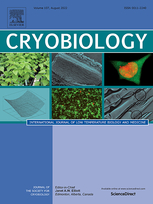
Résumé
Mesenchymal stem cells (MSCs) can be used for the regeneration of various tissues and cryopreservation of MSCs is so important for regenerative medicine. The purpose of this study was to evaluate the influences of cryopreservation on MSCs by use of a programmed freezer with a magnetic field (CAS freezer). MSCs were isolated from bone marrow of rat femora. The cells were frozen by a CAS freezer with 10% dimethyl sulfoxide (Me2SO) and cryopreserved for 7 days at a temperature of -150 °C. Immediately after thawing, the number of survived cells was counted. The cell proliferation also examined after 48 h culture. Next, MSCs were frozen by two different freezers; CAS freezer and a conventional programmed freezer without magnetic field. Then, osteogenic and adipogenic differentiations of cryopreserved cells were examined. As a result, survival and proliferation rates of MSCs were significantly higher in CAS freezer than in the non-magnetic freezer. Alizarin positive reaction, large amount of calcium quantification, and greater alkaline phosphatase activity were shown in both the non-cryopreserved and CAS groups after osteogenic differentiation. Moreover, Oil Red O staining positive reaction and high amount of PPAR? and FABP4 mRNAs were shown in both the non-cryopreserved and CAS groups after adipogenic differentiation. From these findings, it is shown that a CAS freezer can maintain high survival and proliferation rates of MSCs and maintain both adipogenic and osteogenic differentiation abilities. It is thus concluded that CAS freezer is available for cryopreservation of MSCs, which can be applied to various tissue regeneration.
Détails
- Titre original : Cryopreservation of rat MSCs by use of a programmed freezer with magnetic field.
- Identifiant de la fiche : 30011370
- Langues : Anglais
- Source : Cryobiology - vol. 67 - n. 3
- Date d'édition : 12/2013
- DOI : http://dx.doi.org/10.1016/j.cryobiol.2013.08.003
Liens
Voir d'autres articles du même numéro (4)
Voir la source
Indexation
- Thèmes : Influence du froid sur les cellules, tissus et organes
- Mots-clés : Cellule; Rat; Cryoconservation; Congélateur; Champ magnétique
-
Cryopreservation of osteoblasts by use of a pro...
- Auteurs : KOSEKI H., KAKU M., KAWATA T., et al.
- Date : 01/2013
- Langues : Anglais
- Source : CryoLetters - vol. 34 - n. 1
Voir la fiche
-
Cryopreservation of human embryonic stem cells ...
- Auteurs : LIN P. Y., YANG Y. C., HUNG S. H., et al.
- Date : 06/2013
- Langues : Anglais
- Source : Cryobiology - vol. 66 - n. 3
Voir la fiche
-
MONOLAYER GROWTH AND DIFFERENTIATED FUNCTION OF...
- Auteurs : MAY J. V.
- Date : 1982
- Langues : Anglais
- Source : Biol. Reprod. - vol. 27 - n. 3
Voir la fiche
-
An evaluation of the preservability of modified...
- Auteurs : KAGAYA H., ISHII F., HANADA K., ISHIBASHI Y., ARAI T., SATO K., KAKITA A., SHIMADA S., OGATA H.
- Date : 12/1996
- Langues : Anglais
- Source : Cryobiology - vol. 22 - n. 4
Voir la fiche
-
ON THE MECHANISM OF THE FREEZE-INDUCED CONDUCTI...
- Auteurs : BERGER W. K., TOVAR O.
- Date : 01/1990
- Langues : Anglais
- Source : Cryo-Letters - vol. 11 - n. 1
Voir la fiche
